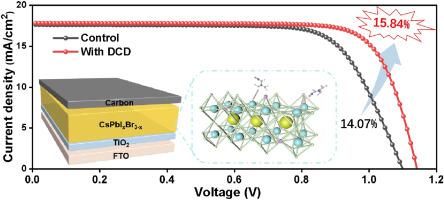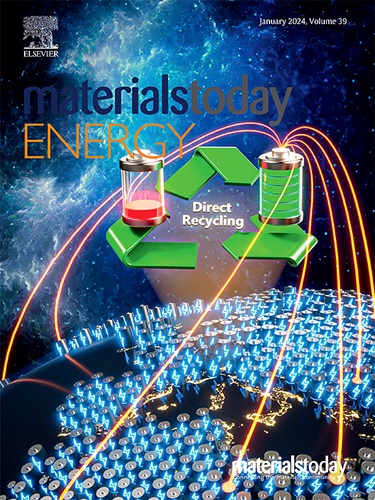双氰胺添加剂工程用于高性能碳基无机过氧化物太阳能电池
IF 8.6
2区 材料科学
Q1 CHEMISTRY, PHYSICAL
引用次数: 0
摘要
不含空穴传输层(HTL)的全无机 CsPbIBr 碳基包晶石太阳能电池(C-PSCs)因其低成本和出色的稳定性而备受关注。器件效率不高是制约其商业化的一个障碍,这主要是由于无机过氧化物薄膜中存在大量的界面和块体缺陷。在本研究中,有机小分子双氰胺(DCD)作为添加剂被加入到过氧化物前驱体中,以同时调节结晶动力学和钝化无机过氧化物薄膜的缺陷。实验证明,DCD 的引入不仅能加速中间相 DMAPbI 向无机包晶的转变过程,还能通过氰基(CN)、亚胺基(CN)和未配位铅之间的路易斯酸碱作用钝化缺陷。同时,能级排列也得到了优化,从而有效提高了 CsPbIBr C-PSC 的电荷传输效率。因此,优化后的器件效率从 14.07% 提高到了 15.84%,同时长期稳定性也得到了改善。本文章由计算机程序翻译,如有差异,请以英文原文为准。

Additive engineering by dicyandiamide for high-performance carbon-based inorganic perovskite solar cells
Hole transport layer (HTL)-free, all-inorganic CsPbIBr carbon-based perovskite solar cells (C-PSCs) have attracted much attention due to their low cost and excellent stability. The poor device efficiency is a barrier to constrain its commercialization, mainly due to the large amount of interfacial and bulk defects existed in inorganic perovskite films. In this study, an organic small molecule dicyandiamide (DCD) is added to the perovskite precursor as an additive to adjust the crystallization kinetics and passivate defects of inorganic perovskite films, simultaneously. It is demonstrated that the introduction of DCD can not only accelerate the transition process from intermediate-phase DMAPbI to inorganic perovskite, but also passivate defects through the Lewis acid-base interaction between cyano (CN), imine (CN) groups, and uncoordinated Pb. Meanwhile, the energy level alignment was optimized, which effectively improves the charge transport efficiency of CsPbIBr C-PSCs. As a result, optimized device shows an enhanced efficiency from 14.07% to 15.84%, accompanied by improved long-term stability.
求助全文
通过发布文献求助,成功后即可免费获取论文全文。
去求助
来源期刊

Materials Today Energy
Materials Science-Materials Science (miscellaneous)
CiteScore
15.10
自引率
7.50%
发文量
291
审稿时长
15 days
期刊介绍:
Materials Today Energy is a multi-disciplinary, rapid-publication journal focused on all aspects of materials for energy.
Materials Today Energy provides a forum for the discussion of high quality research that is helping define the inclusive, growing field of energy materials.
Part of the Materials Today family, Materials Today Energy offers authors rigorous peer review, rapid decisions, and high visibility. The editors welcome comprehensive articles, short communications and reviews on both theoretical and experimental work in relation to energy harvesting, conversion, storage and distribution, on topics including but not limited to:
-Solar energy conversion
-Hydrogen generation
-Photocatalysis
-Thermoelectric materials and devices
-Materials for nuclear energy applications
-Materials for Energy Storage
-Environment protection
-Sustainable and green materials
 求助内容:
求助内容: 应助结果提醒方式:
应助结果提醒方式:


